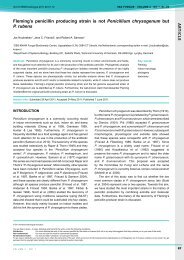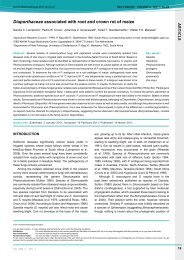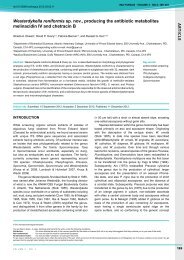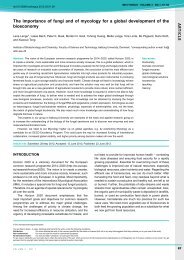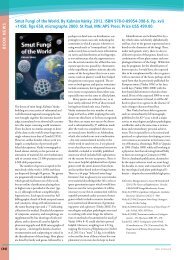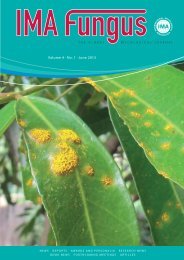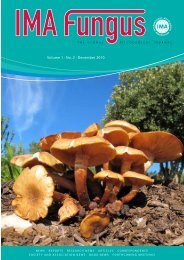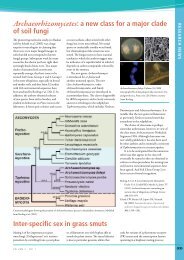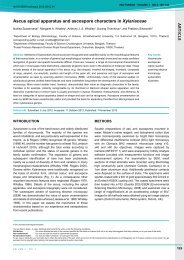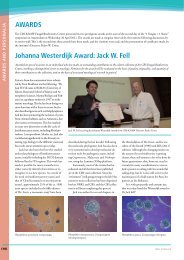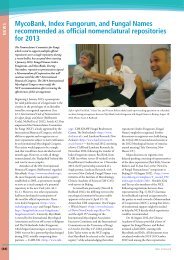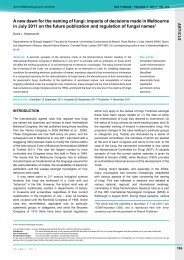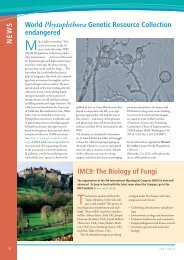Complete issue - IMA Fungus
Complete issue - IMA Fungus
Complete issue - IMA Fungus
You also want an ePaper? Increase the reach of your titles
YUMPU automatically turns print PDFs into web optimized ePapers that Google loves.
COST Action FA1103: European scientists<br />
investigating endophytic microrganisms and fungi<br />
As announced in <strong>IMA</strong> <strong>Fungus</strong> 3 (1): (7)<br />
( June 2012), this European Cooperation<br />
in Science and Technology (COST)<br />
programme aims to promote research into<br />
the exploitation of endophytic fungi and<br />
bacteria in biotechnology and agriculture.<br />
In large funding schemes related to “White<br />
Biotechnology” and “Bioeconomy”, these<br />
organisms are now being exploited not<br />
only as biocontrol agents, but as producers<br />
of fine chemicals, industrial enzymes, and<br />
even biofuel from plant waste (Stadler<br />
& Schulz 2009). However, there are still<br />
bottlenecks limiting the full exploitation of<br />
their potential, and insufficient knowledge<br />
of their ecology.<br />
COST Action FA1103, “Endophytes<br />
in Biotechnology and Agriculture” 1 ,<br />
is now getting underway. The Action<br />
has so far been joined by 20 countries,<br />
and around 150 scientists from over 50<br />
institutions are actively involved. Most<br />
have already contributed to the scientific<br />
programme, and the number of interested<br />
scientists is steadily increasing. The ratios<br />
of bacteriologists vs. mycologists, and<br />
applied vs. basic scientists, involved are<br />
about balanced. Indeed, several scientists<br />
and companies involved are dealing with<br />
both bacteria and fungi, and numerous<br />
active European research groups in basic<br />
and applied mycology and microbiology are<br />
represented.<br />
The Action is divided into four<br />
thematic working groups (WG), which<br />
do, however, closely interact with one<br />
another: WG1 (Ecology of endophytes),<br />
WG2 (Identification of new competent<br />
endophytes), WG3 (Development of<br />
new microbial inocula), and WG4 (New<br />
industrial products in life sciences). One<br />
important goal will be to bring expertise in,<br />
for example, molecular ecology, taxonomy,<br />
and other fields of basic research, together<br />
with applied aspects, such as bioprospecting<br />
and biocontrol.<br />
Even though the COST Action cannot<br />
provide direct funding for joint research<br />
activities, several joint projects, based on<br />
1<br />
For more information see: www.endophytes.eu<br />
(Action website), and http://www.cost.eu/domains_<br />
actions/fa/Actions/FA1103?parties (corresponding<br />
COST website).<br />
Participants in the Reims COST workshop (March 2012).<br />
Plants are associated with micro-and nano-organisms: endophytic bacteria and fungi, which live interand<br />
intra-cellularly in plants without inducing pathogenic symptoms, while interacting with the host<br />
biochemically and genetically. Endophytic microorganisms may function as plant growth and defense<br />
promoters by synthesising phytohormones, producing biosurfactants, enzymes or precursors for<br />
secondary plant metabolites, fixing atmospheric nitrogen and CO 2 , or controlling plant diseases, as<br />
well as providing a source for new bioactive natural products with utility in pharmaceutical,<br />
agrochemical and other LifeScience applications. The use of these endophytic microorganisms to<br />
control plant-pathogenic bacteria and fungi is receiving increased attention as a sustainable alternative<br />
to synthetic pesticides and antibiotics. Furthermore, endophytes may be adapted to the presence and<br />
metabolism of complex organic molecules and therefore can show useful biodegradation properties. In<br />
Participants order to reduce in the inputs San Michele of pesticides dell’Adige and COST fertilizers workshop and add (November value to 2012). eco-friendly agriculture in Europe,<br />
it will be important to develop inocula of biofertilizers, stress protection and biocontrol agents. But<br />
there are currently bottlenecks limiting the development of endophytes for use in biotechnology and<br />
synergies agriculture. and institutional budgets of the<br />
participating institutes and companies, have<br />
already been initiated. The meetings of the<br />
Action provide a fruitful atmosphere for<br />
discussions about future international grant<br />
applications on interdisciplinary themes<br />
that could eventually result in successful<br />
applications for calls by the European<br />
Commission.<br />
Two well-attended workshops have<br />
already been held; in Reims (France) in<br />
March 2012) and San Michele dell’ Adige<br />
near Trento (Italy) in November 2012.<br />
Members of the Action presented their<br />
scientific results in symposia and poster<br />
sessions at these workshops. International<br />
experts were invited to deliver keynoe<br />
lectures, for example Linda Johnson (New<br />
Zealand) and T. S. Suryanarayanan (India)<br />
addressed the Trento meeting.<br />
It is envisaged that members of the<br />
Action will co-organise some symposia<br />
at the conference “Endophytes for plant<br />
protection: the state of the art” in Berlin<br />
in May 2013. The German Society for<br />
Plant Protection and Plant Health (DPG)<br />
is to sponsor this meeting, which is also<br />
being promoted by IUBS (International<br />
Union of Biological Sciences). The topics<br />
the Working Group sessions will cover<br />
include one on the construction and design<br />
of a European database on endophytes.<br />
Furthermore, training schools are also<br />
planned, for instance on analyses of natural<br />
products and statistical computing and<br />
graphics. A special <strong>issue</strong> of Fungal Diversity,<br />
covering the mycological parts of the<br />
Action is planned for publication during<br />
2013. Complementary publications are also<br />
planned by participating bacteriologists,<br />
and participation in several important<br />
European and international conferences<br />
will follow. Outreach activities include an<br />
interview recently reported in International<br />
Innovation Reports.<br />
<br />
Aside from networking, the Action<br />
particularly supports early stage researchers<br />
(ESR). Further, the programme also<br />
provides for “Short Term Scientific<br />
Missions” (STMS), during which ESR<br />
and other scientists will receive funding<br />
from COST to visit different European<br />
laboratories for up to three months for<br />
training in complementary disciplines or to<br />
conduct joint research; 8-10 such postings<br />
can be funded each year. The Action can<br />
also provide travel grants to enable highly<br />
qualified ESR to attend international<br />
scientific meetings.<br />
An example of the kind of results to<br />
be expected from the joint investigations<br />
of bioprospectors and biodiversity experts<br />
is that of Bills et al. (2012). That study<br />
emphasised that culturing of apparently new<br />
phylogenetic lineages will be imperative not<br />
only to make them available for sustainable<br />
biotechnological exploitation, but also<br />
to elucidate life-cycles and ecological<br />
To increase understanding about these hidden associations between plants, bacteria and fungi, and to<br />
identify bottlenecks in the development and implementation of technologies using endophytes, a<br />
network of scientists was recently formed. The present COST Action FA1103: ‘Endophytes in<br />
biotechnology and agriculture’ will operate all over Europe during the next four years and will provide a<br />
forum for the identification of bottlenecks limiting the use of endophytes in biotechnology and<br />
agriculture and ultimately provide solutions for the economically and ecologically compatible<br />
exploitation of these organisms within Europe and beyond.<br />
Four working group will be held during the meeting as follow:<br />
WG1. Ecology of endophytes<br />
WG2. Identification of new competent endophytes<br />
WG3. Development of new microbial inocula<br />
WG4. New industrial products in life sciences<br />
Enjoy your meeting and welcome in Reims,<br />
REPORTS<br />
volume 3 · no. 2<br />
(51)



